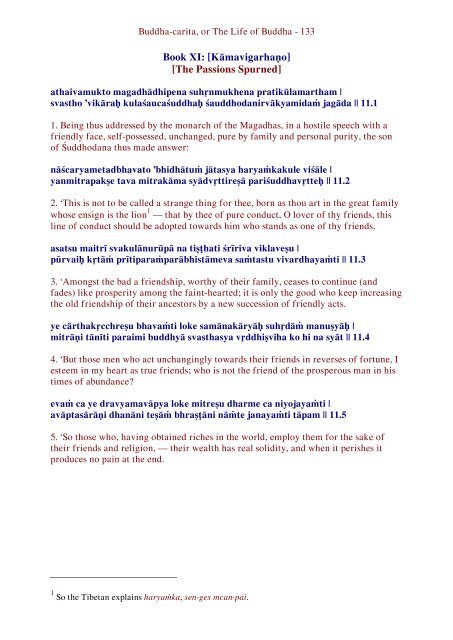The Buddha-Carita or The Life of Buddha by Ven. Aśvaghoṣa
A Sanskrit and English line by line (interlinear) version of one of the most important and influential biographies of the Buddha (together with extensive annotation).
A Sanskrit and English line by line (interlinear) version of one of the most important and influential biographies of the Buddha (together with extensive annotation).
You also want an ePaper? Increase the reach of your titles
YUMPU automatically turns print PDFs into web optimized ePapers that Google loves.
<strong>Buddha</strong>-carita, <strong>or</strong> <strong>The</strong> <strong>Life</strong> <strong>of</strong> <strong>Buddha</strong> - 133<br />
Book XI: [Kāmavigarhaṇo]<br />
[<strong>The</strong> Passions Spurned]<br />
athaivamukto magadhādhipena suhnmukhena pratikūlamartham |<br />
svastho ’vikāraḥ kulaśaucaśuddhaḥ śauddhodanirvākyamida jagāda || 11.1<br />
1. Being thus addressed <strong>by</strong> the monarch <strong>of</strong> the Magadhas, in a hostile speech with a<br />
friendly face, self-possessed, unchanged, pure <strong>by</strong> family and personal purity, the son<br />
<strong>of</strong> Śuddhodana thus made answer:<br />
nāścaryametadbhavato ’bhidhātu jātasya haryakakule viśāle |<br />
yanmitrapakṣe tava mitrakāma syādvttireṣā pariśuddhavtteḥ || 11.2<br />
2. ‘This is not to be called a strange thing f<strong>or</strong> thee, b<strong>or</strong>n as thou art in the great family<br />
whose ensign is the lion 1 — that <strong>by</strong> thee <strong>of</strong> pure conduct, O lover <strong>of</strong> thy friends, this<br />
line <strong>of</strong> conduct should be adopted towards him who stands as one <strong>of</strong> thy friends.<br />
asatsu maitrī svakulānurūpā na tiṣṭhati śrīriva viklaveṣu |<br />
pūrvaiḥ ktā prītiparaparābhistāmeva satastu vivardhayati || 11.3<br />
3. ‘Amongst the bad a friendship, w<strong>or</strong>thy <strong>of</strong> their family, ceases to continue (and<br />
fades) like prosperity among the faint-hearted; it is only the good who keep increasing<br />
the old friendship <strong>of</strong> their ancest<strong>or</strong>s <strong>by</strong> a new succession <strong>of</strong> friendly acts.<br />
ye cārthakcchreṣu bhavati loke samānakāryāḥ suhdā manuṣyāḥ |<br />
mitrāṇi tānīti paraimi buddhyā svasthasya vddhiṣviha ko hi na syāt || 11.4<br />
4. ‘But those men who act unchangingly towards their friends in reverses <strong>of</strong> f<strong>or</strong>tune, I<br />
esteem in my heart as true friends; who is not the friend <strong>of</strong> the prosperous man in his<br />
times <strong>of</strong> abundance?<br />
eva ca ye dravyamavāpya loke mitreṣu dharme ca niyojayati |<br />
avāptasārāṇi dhanāni teṣā bhraṣṭāni nāte janayati tāpam || 11.5<br />
5. ‘So those who, having obtained riches in the w<strong>or</strong>ld, employ them f<strong>or</strong> the sake <strong>of</strong><br />
their friends and religion, — their wealth has real solidity, and when it perishes it<br />
produces no pain at the end.<br />
1 So the Tibetan explains haryaka, sen·ges mcan·pai.


















